Engineers and other professionals involved in improving equipment reliability often observe that more work is to be done than budgeted or ever anticipated by management staff. Experienced observers frequently see a need to close the gap between “professed interest” in reliable plants and the pursuit of practices that make plants reliable. In the process, issues of workplace safety have been known to arise.
Consider, for example, the following letter from a reader who detailed his frustration working as a factory’s maintenance manager and asked for direction on closing that described “gap.” He wrote:
”I see unsafe actions or conditions every day. Whenever I then confront the responsible unit supervisors, they tell me that’s how it has always been done here. Or, if I explain to the employees involved that such-and-such is not a safe practice they threaten me or yell in my face while the production manager stands by and laughs it off. My sense of self-respect wants me to fight back, but my manager training and sense of self-preservation take over. I then follow the chain of command.
But nothing happens. I have been here for only a few months and am already looking for a new job. I love what I do, but I cherish working in a safe environment more. I don’t want anyone to get hurt or worse. I have brought up some big equipment-safety issues with management, and even with the company’s vice president. The inevitable answer mentions budget constraints and unaffordable cost run-ups. I know that’s not a sensible answer. So, what advice would you give me?”
Before discussing our response to that letter, it’s important to remind readers of the following point: In the United States, a maintenance manager is legally responsible and accountable for enforcing workplace-safety policies and safety regulations. Supervisors are also legally responsible and accountable. If a tragic accident occurs and is investigated, all supervision and management, all the way up to the top of the organization, are liable. Safety is the responsibility of every employee. But management is held accountable.
Regarding the referenced maintenance manager’s request for advice, we recommended six tangible steps he could take toward moving the reluctant, complacent, and generally indifferent advocates of “business as usual” from opinion-based hope to unassailable hard facts and appropriate action. We paraphrase those suggestions here for others who might find themselves in similar situations:
1. Start keeping a pocket-size journal (quietly) and make detailed notes when you see something
unsafe (what it is, what risk results from it, and what you suggest may solve the issue).
2. Always follow up by informing a supervisor or boss about the situation and your suggestion.
Do it in writing; call it an inter-office memo and safeguard your own copy of the communication.
3. Document (and save) each recipient’s reply, with date, and time of response.
Do not leave the journal with your notes laying around anywhere. Get a new pocket-size journal
when the old one is full. This will help keep your head clear and ensure that you don’t become
insensitive to violations.
Committing details to your journal is extremely important. While it may not change anything,
it will, nevertheless:
4. Protect you should something bad happen (and something will happen, sooner or later).
5. Remind you to stay focused on seeking a new (employment) opportunity.
6. Provide you with new ideas to use in your next job.
In addition to considering the above approach, the letter writer and others in similar positions should ask themselves why it’s often difficult to sell their superiors on intuitively safer and more reliable work processes and procedures. The answer could be that they’re going about it by conveying opinions instead of facts.
Opinions can be right or wrong. They can (and will) be disputed. However, facts are facts, regardless of if and how they are disputed. That’s where our recommended six steps come in: Your next employer, in turn, should have great value for your respect of facts and how you handle such situations.TRR
Editor’s Note: Click Here To Download A Complete List Of Heinz Bloch’s 22 Books
ABOUT THE AUTHOR
Heinz Bloch’s long professional career included assignments as Exxon Chemical’s Regional Machinery Specialist for the United States. A recognized subject-matter-expert on plant equipment and failure avoidance, he is the author of numerous books and articles, and continues to present at technical conferences around the world. Bloch holds B.S. and M.S. degrees in Mechanical Engineering and is an ASME Life Fellow. These days, he’s based near Houston, TX. Email him at heinzpbloch@gmail.com.
Tags: reliability, availability, maintenance, RAM, workplace safety, OSHA, personnel safety, process safety, machine safety



